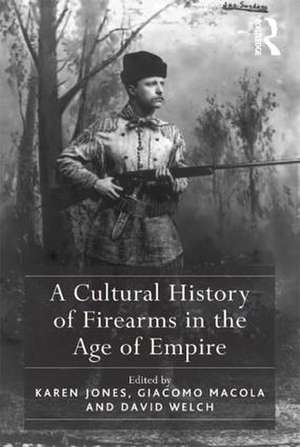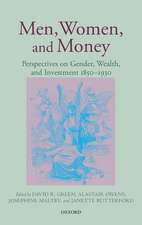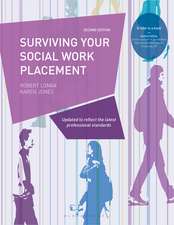A Cultural History of Firearms in the Age of Empire
Autor Karen Jones Editat de Giacomo Macolaen Limba Engleză Hardback – 26 aug 2013
| Toate formatele și edițiile | Preț | Express |
|---|---|---|
| Paperback (1) | 263.15 lei 6-8 săpt. | |
| Taylor & Francis – 14 oct 2024 | 263.15 lei 6-8 săpt. | |
| Hardback (1) | 1064.98 lei 6-8 săpt. | |
| Taylor & Francis – 26 aug 2013 | 1064.98 lei 6-8 săpt. |
Preț: 1064.98 lei
Preț vechi: 1298.76 lei
-18% Nou
Puncte Express: 1597
Preț estimativ în valută:
203.79€ • 217.92$ • 169.91£
203.79€ • 217.92$ • 169.91£
Carte tipărită la comandă
Livrare economică 17 aprilie-01 mai
Preluare comenzi: 021 569.72.76
Specificații
ISBN-13: 9781409447528
ISBN-10: 1409447529
Pagini: 330
Dimensiuni: 156 x 234 x 19 mm
Greutate: 0.75 kg
Ediția:New.
Editura: Taylor & Francis
Colecția Routledge
Locul publicării:Oxford, United Kingdom
ISBN-10: 1409447529
Pagini: 330
Dimensiuni: 156 x 234 x 19 mm
Greutate: 0.75 kg
Ediția:New.
Editura: Taylor & Francis
Colecția Routledge
Locul publicării:Oxford, United Kingdom
Cuprins
Contents: Introduction: new perspectives on firearms in the age of empire, Karen Jones, Giacomo Macola and David Welch; Part I Adopting Guns: Environment, Class and Gender on the Imperial Frontier: Guns, violence and identity on the trans-Appalchian American frontier, Matthew C. Ward; Guns, masculinity and marksmanship: codes of killing and conservation in the 19th-century American West, Karen Jones; Fishers of men and hunters of lion: British missionaries and big game hunting in colonial Africa, Jason Bruner; Cockney sportsmen? Recreational shooting in London and beyond, 1800-1870, Matthew Cragoe. Part II Resisting Guns: Edged Weapons and the Politics of Indigenous Honour: ’They disdain firearms’: the relationship between guns and the Ngoni of eastern Zambia to the early 20th century, Giacomo Macola; ’Hardly a place for a nervous old gentleman to take a stroll’; firearms and the Zulu during the Anglo-Zulu War, Jack Hogan; Steel and blood: for a cultural history of edged weapons between the late 19th and the early 20th centuries, Gianluca Pastori. Part III Controlling Guns: Gun Laws, Race and Citizenship: The battle of Dubai: firearms on Britain’s Arabian frontier, 1906-1915, Simon Ball; ’Give him a gun, NOW’: soldiers but not quite soldiers in South Africa’s Second World War, 1939-1945, Bill Nasson; ’Better die fighting against injustice than to die like a dog’: African-Americans and guns, 1866-1941, Kevin Yuill. Part IV Celebrating Guns: Firearms in Popular and Military Cultures: Retrospective icon: the Martini-Henry, Ian F.W. Beckett; ’The shooting of the Boers was extraordinary’: British views of Boer marksmanship in the 2nd Anglo-Boer War, 1899-1902, Spencer Jones; Irish paramilitarism and gun cultures, 1910-1921, Timothy Bowman; Bibliography; Index.
Notă biografică
Karen Jones is Senior Lecturer in History at the University of Kent, and specializes in US and Environmental history. She has published widely on environmental issues and the American West specifically, and is currently completing a manuscript for the University of Colorado Press on hunting, nature and the nineteenth-century American West. Giacomo Macola is Senior Lecturer in African History at the University of Kent. The author of numerous articles on Zambian history, his latest monograph is entitled Liberal Nationalism in Central Africa: A Biography of Harry Mwaanga Nkumbula (2010). He is currently writing a social history of the gun in Central Africa to the early twentieth century. David Welch is Professor of Modern History and Director of the Centre for the Study of War, Propaganda and Society at the University of Kent. His books include Germany, Propaganda and Total War, 1914-1918 (2000) and The Third Reich: Politics and Propaganda (2002). He is the editor (with Jo Fox) of Justifying War: Propaganda, Politics and the Modern Age (2012). His latest book, Propaganda: Power and Persuasion, will be published in 2013 to coincide with opening of the British Library’s exhibition of the same name.
Recenzii
’This is a fascinating collection, spanning four continents. It shows how guns are not only for killing with, but also for thinking with, and so for creating identities, often masculine and often ethnic. I congratulate the authors and editors.’ Prof. dr. Robert Ross, Leiden University Institute for History
Descriere
Firearms have been studied by imperial historians mainly as means of human destruction and material production. Yet, as suggested by constructivist approaches to the history of technology, firearms have always been invested with a whole array of additional social meanings. By placing these latter at the centre of analysis, the essays presented in A Cultural History of Firearms in the Age of Empire extend the study of guns beyond the confines of military history and the examination of their impact on specific colonial encounters. By bringing cultural perspectives to bear on the subject, the contributors explore the densely interwoven relationships between firearms and broad processes of social change.













